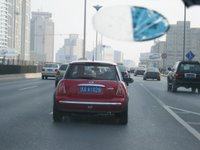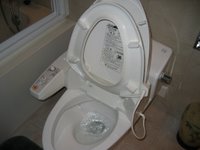It's hard to summarize the trip, but here's a stab:
1. Dirt. After spotless Tokyo it's quite a shock. I'm used to dirty streets and buildings, but the polluted air really bothered me. I wonder if the 2008 Olympians will need respirators.
2. Cheap! You're shopping at Wal-Mart's Wal-Mart. I didn't haggle well and probably paid triple what I should have for a coat, but I still did well. The Carrefour (no haggling required) was amazing.
3. Huge business opportunities. China has business computing problems that only mainframes can solve. The forecasted transaction volumes for many of these businesses are enormous. I visited one customer that will probably be running 50,000 per second within five years. (Yes, we can do it even today. Nobody else can.)
4. Growth. Everywhere you turn there's a construction crane. Workers are slapping up buildings as fast as they possibly can. I visited another customer that moved into its offices two weeks ago, and workers were still trying to finish up the inside of the building.
5. Government. I had interactions (directly or indirectly) with five Chinese businesses. All five are owned, partially or fully, by the Government. The state as the ultimate capitalist!
 6. Traffic. I read in China Daily that every day there are 1,000 more cars added to Beijing's already crowded streets. Mix with bicycles, buses, motorscooters, pedestrians, carts, and several other ways of getting around and you've got a deadly mess. There are no rules of the road. I heard lots of stories (which I believe) about awful car crashes with lots of carnage. "Life is cheap here," said one outsider.
6. Traffic. I read in China Daily that every day there are 1,000 more cars added to Beijing's already crowded streets. Mix with bicycles, buses, motorscooters, pedestrians, carts, and several other ways of getting around and you've got a deadly mess. There are no rules of the road. I heard lots of stories (which I believe) about awful car crashes with lots of carnage. "Life is cheap here," said one outsider.The whole place is probably like Chicago was in the mid-1800s, or California during the 1849 Gold Rush. The boom is in full overdrive. Let's hope China doesn't repeat the same mistakes.
